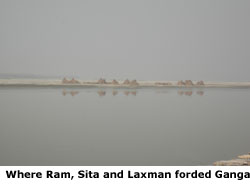Radio in real player
Maps:
Allahabad
Haridwar-Varanasi
Varanasi
Side texts:
Concept of time
Saraswati
Kashi
Tirthas
The
Yamuna
The IDEA of TIME in INDIAN CULTURE
The Ramayana is as present
to the villagers here as if it had unfolded within their own lifetimes. I’ve
often wondered: how come? For Tivari, it always seems that such and such event
occurred literally yesterday, certainly within the lifetime of his grandfather,
when we know it really took place (if at all) two or three thousand years
ago! It is very real to him. But why?

Tivari looks mystified when I ask him, but later
in Delhi my friend Sharada Nayak says it’s simple. ‘In an oral
culture, stories are repeated day after day till they become real. They may
just as well have happened yesterday. Not that one always believes these stories
actually occurred.’ The Ramayana or the Mahabharata therefore can unlock
the door to understanding a very different sense of time. For someone raised
in the Indian countryside (still the vast majority of Indians) what’s
most important is the actual experience.
As Sharada explains, ‘If you tell me that
such and such a thing happened, and you tell it well, it is immediately vivid.
I believe it. It isn’t important if it happened to you yesterday or
it happened ten years ago. What’s important is the very fact that it
happened to you and affected you so deeply and that your narration conveys
this to me. It’s the event, the transformation, not when, that’s
important.’
Sharada continues: ‘If you identify
with the Ramayana myth or the Mahabharata myth so strongly, actual time (the
date or the year) becomes unimportant. The fact that it happened is what is
important. If it happened, it has implications for the entirety of human experience.’
Whole centuries, even millennia, are collapsed through oral folklore into
the span of a single lifetime.
Great myths such as the Ramayana also help define
a sense of the geography of India because, ‘Stories are the traditional
ways of defining the shape and geography of the land. My great-grandmother
was totally illiterate but she heard these stories so she knew all of India
even though she’d never travelled beyond her village.’
For most Indians, time is naturally circular,
an idea so basic to Indians they probably never stop to even think about it.
But it’s one that never seems to occur to non-Indians. Other non-Western
civilisations (China, Islam) continue to function quite well with their own
calendars. Amartya Sen has a very interesting analysis of the various calendars
(Hindi, Bengali, Tamil, etc) in use in today’s India in his recent book
The Argumentative Indian. Western culture, on the other hand, has a linear
concept of Time, which is closely linked to a Western idea of Progress. The
Present is better than the Past, and the Future will be by definition better
than the Present. My friend Indu Agarwal thinks this is just plain stupid.
Time for her is circular, so human beings are fated to repeat the same mistakes,
warts and all.
Radio in real player
Maps:
Allahabad
Haridwar-Varanasi
Varanasi
Side texts:
Concept of time
Saraswati
Kashi
Tirthas
The
Yamuna
Maps:
Allahabad
Haridwar-Varanasi
Varanasi
Side texts:
Concept of time
Saraswati
Kashi
Tirthas
The
Yamuna